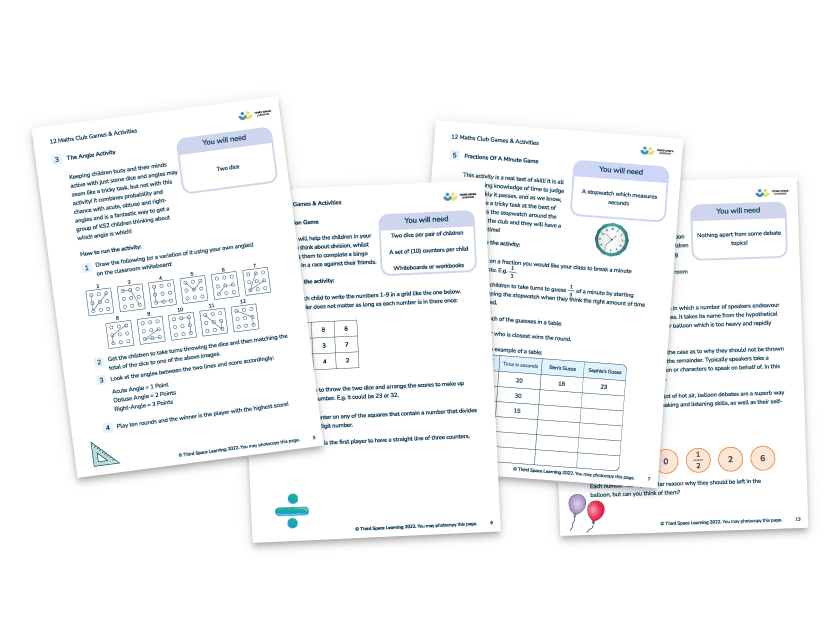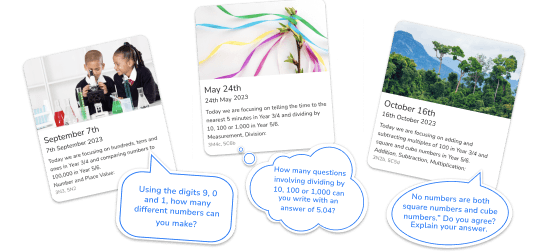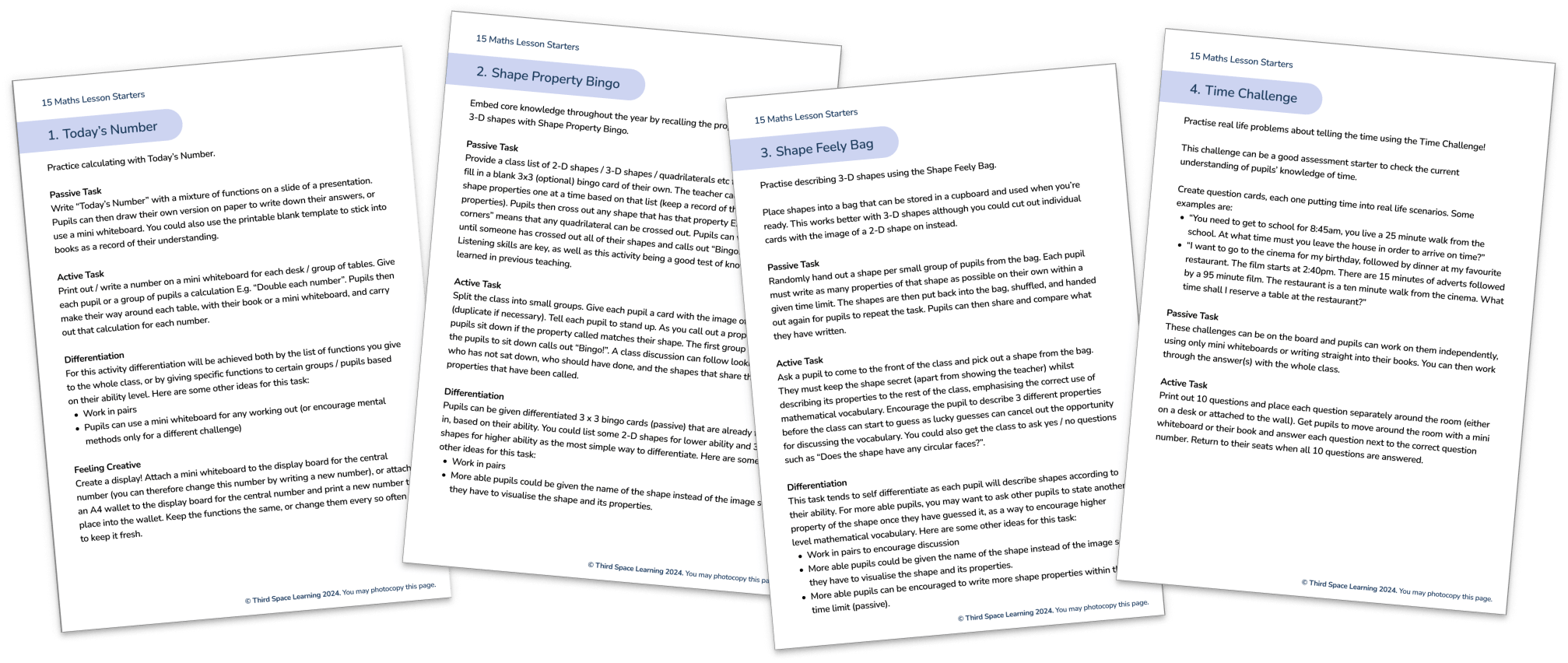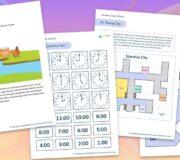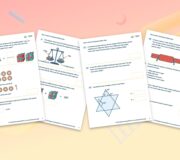Maths Starters: 15 Free KS1 & KS2 Starters To Download & Use With Your Class
These free maths starters are versatile primary teaching resources that can be used across all year groups in KS1 and KS2. Here we look at some ideas for how and when you can use them and provide you with 15 free maths starters created specifically for primary school.
- What are maths starters?
- How to use maths starters in the classroom
- Why use maths starters at KS?
- Benefits of maths starters
- 15 Free & Fun Maths Starters For KS1 & KS2
- Maths Starter 1: Today’s Number
- Maths Starter 2: Shape Property Bingo
- Maths Starter 3: Shape Feely Bag
- Maths Starter 4: Time Challenge
- Maths Starter 5: Same Time Card Match
- Maths Starter 6: Number Bonds Practice
- Maths Starter 7: Find the Missing Number
- Maths Starter 8: Classic Puzzle
- Maths Starter 9: Price It Up! Money Challenge
- Maths Starter 10: Make Some Profit
- Maths Starter 11: Venn Diagram Games
- Maths Starter 12: Tally Chart Practice
- Maths Starter 13: Code Breakers
- Maths Starter 14: Vocabulary Quiz
- Maths Starter 15: Probability
- How to plan a week’s worth of maths lesson starters
What are maths starters?
Maths starters are the 5-15 minute activities you do with your class at the beginning of the lesson, as a transition activity to a new topic or between break and lesson time. They’re one of the ways teachers try to make the most of every moment we have in the school day.
Depending on the curriculum or scheme of work you’re following you may find starter activities built into each lesson to introduce the topic or you may prefer your starter activity to be a way to revise previously learnt information. The great thing is that you can choose to use the maths starters in whichever way best suits your class and your learners.
How to use maths starters in the classroom
Maths starter activities are very adaptable and there are a lot of ways to use them to kick off a lesson including:
- consolidating previously taught work
- using them as an assessment opportunity
- simply starting off a lesson with a (shhh!) fun maths game.
However you use them, maths starters can really help a lesson flow from session transition chaos to a calm and collected primary classroom, setting the scene for the rest of the lesson.
These 10 minutes are often considered a bit of a throwaway, but, if planned carefully into both long-term and mid-term plans as well as your weekly planning, they can be beneficial.
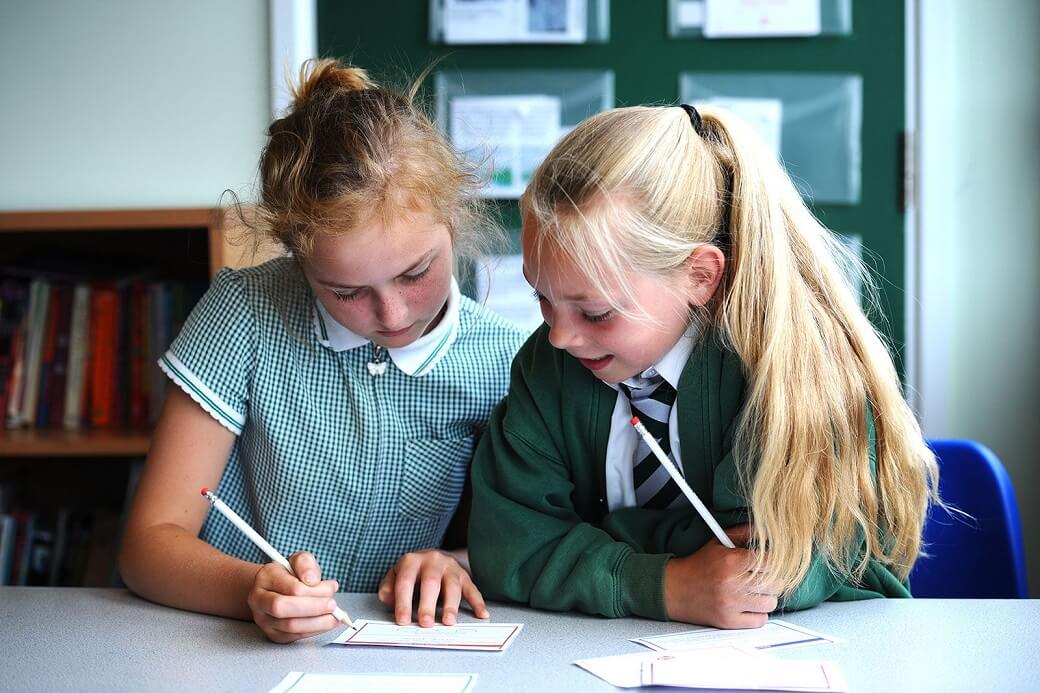
Why use maths starters at KS?
Maths lesson starters are a great way to ensure no maths topic or numeracy concept is forgotten. From fractions and decimals to mental maths and shapes, maths starters help to serve as a reminder of previously taught concepts so you can move on to teach new ones.
They can work in tandem with the national curriculum for England in KS1 and KS2 by consolidating learning. They are fast-paced and fun as opposed to worksheets or powerpoint quizzes that pupils don’t engage with.
Well-timed and planned primary starters can also make a difference to your whole day, making every minute purposeful and structured.
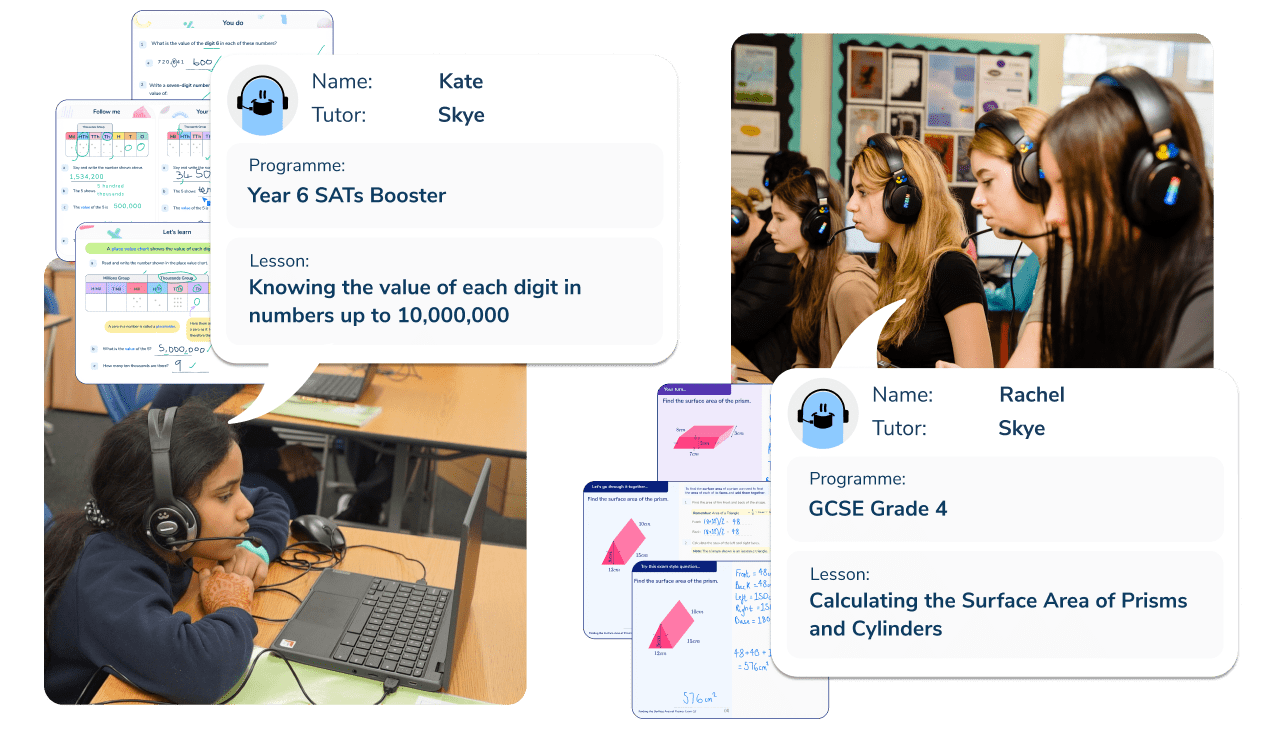
Meet Skye, the voice-based AI tutor making maths success possible for every student.
Built by teachers and maths experts, Skye uses the same pedagogy, curriculum and lesson structure as our traditional tutoring.
But, with more flexibility and a lower cost, schools can scale online maths tutoring to support every student who needs it.
Watch Skye in actionBenefits of maths starters
1. When introducing something new, use your starter to contextualise the new learning.
Playing a dice game to introduce probability is a good example of this.
Playing simple dice games does not require any skills or knowledge of probability as pupils are used to using them for board games.
Therefore, they will happily follow instructions for a game or try and work something out if given a simple task as a starter.
This can lead you straight, and very neatly, into looking more in depth at probability and using their results in the main part of the lesson.
2. Use your maths starter time for a valuable retrieval activity
If multiplication was on the teaching schedule last week, then having a quick recap at the beginning of each lesson this week can provide the perfect opportunity to ensure that the skills are embedded.
Remember, well placed maths starter questions are an invaluable tool in any teacher’s arsenal!
Using starters to recap will also give you the chance to assess and record this information if you are using independent tasks in the starter.
It is also worth mentioning that if a few students struggled last week, it gives you a chance to remind them again in new ways each day to ensure that it knowledge is embedded before moving on completely.
3. Silent maths starters are great for settling a noisy class
If everyone is excited coming into class from the playground or lunch hall, then having the chance to sit in silence and complete the task on the board gives the students time to settle and prepare their learning behaviours for the lesson.
It also helps you, the teacher, to deal quietly with any children who may need extra support to transition – or even just because you need to count the school trip money that arrived in envelopes that morning!
4. You can use a maths starter to incorporate any neglected areas of the curriculum
Telling the time is a good example for this. We all know how little time there is to teach what is quite a tricky concept.
Introducing regular maths lessons starters, once a week or more, which involve telling the time can be a real benefit if your class has a few children who struggle with the concept of time.
By introducing topics as something to begin with rather than a full lesson, you will be able to slowly ensure that the topics you are teaching are embedded without distracting from whatever the curriculum focus is on at that particular time.
15 Free & Fun Maths Starters For KS1 & KS2
We’ve included here, and in the attached free download ideas for 15 maths starters chosen for their suitability for KS1 and KS2. They’re all quick and easy to introduce and cover a range of topics from place value to times tables.
Most of these can be adapted for different age groups but if you’re you’re looking to try one of these maths starters straight away for your class then these are our favourites to try for each year group:
- Maths Starter Year 1: 3. Shape Feely Bag
- Maths Starter Year 2: 6. Number Bonds Practice
- Maths Starter Year 3: Same Time Card Match
- Maths Starter Year 4: Price it Up Money Challenge
- Maths Starter Year 5: Code Breakers
- Maths Starter Year 6: Probability
Below we summarise each maths starter – don’t forget to get the free resource available to download as that also includes ways to differentiate and extend each activity and turn them into more active maths work.
15 Amazingly Fun KS2 Maths Lesson Starters
Get this amazing resource which is packed with starters you can use in your classroom! Each starter comes with an active or passive option so it is easily adaptable to every primary classroom.
Download Free Now!Maths Starter 1: Today’s Number
One of the most common maths display boards in schools has a section for you to add “Today’s number” and then some function options around it such as:
- Double it
- Halve it
- Add 20
- Add 5
- Subtract 4
- Multiply by itself
- Multiply by 10
- Divide by 2
Maths Starter 2: Shape Property Bingo
This is a very simple game of bingo where each pupil needs to
complete a bingo card, but the twist is that these cards have a number
of shapes on them. The teacher calls out properties of the shapes
listed, however some shapes may share properties.
So if the teacher says “Has four corners” the pupils could mark off both
a square and a rectangle or even a quadrilateral. You can use all 2D shapes, all 3D, or a mixture
of both to meet your needs.
Maths Starter 3: Shape Feely Bag
The shape feely bag activity is a great one to store in a cupboard or drawer
ready to come out on an ad-hoc basis when you have time and need to focus
the pupils ready for learning. It is a great way to recap the shape topic and
keep it fresh, and also a lovely introduction to a new topic on shape.
Have a bag full of 3D shapes (you can use 2D too but this does work best
with 3D) and ask pupils to pick one out and, without showing it to everyone,
describe it as best as they can.
You of course want them to use mathematical vocabulary but even likening it to something they know (it is the same shape as a Toblerone) will be a good start and they tend to uplevel from there, especially with higher ability modelling the properties you want described.
Maths Starter 4: Time Challenge
This Time Challenge helps to put the teaching of time in context. It can be
a good assessment starter to see what prior learning pupils have befor
starting a topic on time or at the end of one. It is also a good challenge to
just thrown in in between time topics to ensure they have not forgotten
everything.
You will simply need some cards ready for this task, or you can create new
ones on the whiteboard if preferred, with some challenges on. Each of these are about putting time into real life scenarios.
Some examples are below:
- “You need to get to school for 8.45am, you live a 25 minute walk from the school. At what time must you leave the house in order to arrive on time?”
- “I want to go to the cinema for my birthday, followed by dinner at my favourite restaurant.
- The film starts at 2.40pm. There are 15 minutes of adverts followed by a 95 minute film. The restaurant is a ten minute walk from the cinema. What time shall I reserve a table for at the restaurant?”
Maths Starter 5: Same Time Card Match
This is a very simple game you can have ready at any time. You can have a
set of cards ready to hand out at any time.
Essentially you have some cards with times on and the pupils need to match up the ones which have the same time on. Some will have the time in analogue (12 hour clock), some in digital (24 hour) and some written as words (i.e. twelve fifteen).
Maths Starter 6: Number Bonds Practice
A bit of number bonds practice never goes out of fashion. Whether working on number bonds to ten, twenty, or one hundred. It is worth having a go-to game ready to chuck into the mix whenever you feel they need a reminder(prior to multiplication lessons for example.)
Have some paddles with numbers on which, together with another, will
make the desired number bond result i.e. a 6 and a 4 to make 10. Then you
can call out a number and pupils can hold up the paddle they have if theirs
is the partner of the bond called. They then can call out another number.
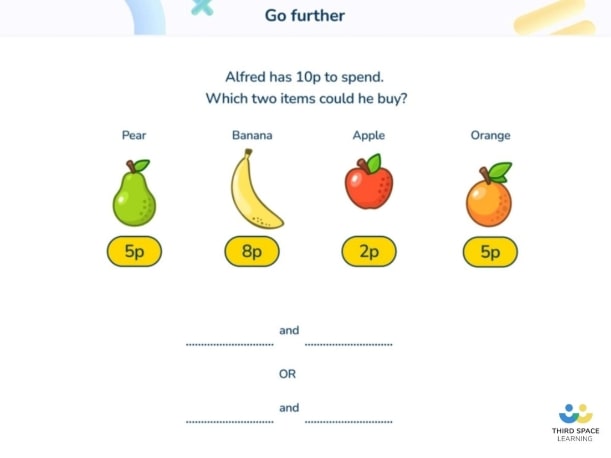
Maths Starter 7: Find the Missing Number
One of the simplest tasks to give out, which you may want to have a few of
in each week’s rotation to challenge with at different times, is the missing
number challenge.
This could be laid out very simply i.e. 3,…,7, 9, 11 or you could lay it out in a number of ways with ever increasing difficulty to encourage discussion, either during or after the task. This helps to find the solution and, most importantly, be sure the answer is right and be able to
explain why.
Maths Starter 8: Classic Puzzle
It may seem old hat to an adult who has heard it a million times but there is a reason certain puzzles stick around through the generations – and that is because they get our brains going and require our logical minds to get into gear.
Puzzles such as the “Chicken, Fox and Grain” brain teaser are classics and rightly so. They will encourage children to think about solutions which are not straight forward but pure common sense once you have got the answers. This will help them to be a bit more flexible in their thinking if they get stuck on word problems and problem solving tasks.
Maths Starter 9: Price It Up! Money Challenge
The Price It Up! Money Challenge is a chance to quickly assess or reassess where your class is with their ability to apply general number concepts to money. It is best, with these tasks, to choose real life situations and give them a set of items or experiences to price up as quickly as they can.
For example: Have a menu for a restaurant with prices on (extra cool teacher points if you ask their local favourite restaurant for a few actual takeaway menus to use) and tell them what they ordered. They then need to price up and ‘pay’ their bill. For extra difficulty ask them to add a tip of a certain percentage!
Add a times tables element to it by ordering different numbers of each item.
Maths Starter 10: Make Some Profit
Who doesn’t love to make some extra profit? Part maths, part business studies. This starter is a great way to introduce a range of skills all around money. Get pupils thinking about making money via work, investments and saving, or generally buying and selling, through tasks and challenges.
The most common “large scale” version of this is the theme park challenge where you plan rides and then look at costs to run them and how much you can charge per ticket. However there are loads of other versions you can dream up.
These could include, for example: “You can buy mangoes for £2 each. You need to decide whether to simply sell them on for £2.50 each, or turn them into smoothies to make £4 per smoothie. Take into account the attached costs list for making a smoothie.” (The list would include costs for electricity, equipment, how many smoothies you can make per mango, etc.
Maths Starter 11: Venn Diagram Games
Graphs and charts are easy mathematical concepts to practice as each time you revisit them the pupils remember what to do. But if you don’t recap them frequently in between using them during their topic they can easily forget which type is which and use the wrong one when the time comes to apply their knowledge.
So offer chances to quickly make physical Venn diagrams and remind pupils of why we are using them versus other chart types.
Try and link some categorisation to your current cross curricular topic if you can. But anything will do for the sake of practicing making Venn diagrams. From a school related topic – is there a crossover between who has brown hair with who has brown eyes, for example?
You could also double up the maths by asking pupils to make Venn diagrams of shape properties. Finding which shapes fit into either “four sides” or “four corners” and which have both (the middle section).
Maths Starter 12: Tally Chart Practice
As with Venn diagrams, Tally Charts come up quite a lot in maths usage, even if it is often to read the data and interpret it rather than make them from scratch. It is therefore useful for pupils to revisit them regularly.
They are also a good way of putting the class in charge of some data collection you may need for something else! So if you need to find out who walks to school versus who drives or cycles etc then give them that to discover.
Or if you need to know who is allergic to certain foods or has a restricted diet i.e. vegan, then this can be a great way to find this out whilst teaching maths. You can do the same with other sorts of data handling such as bar charts or pie charts too. Encourage the children to choose the most suitable chart for the task.
Maths Starter 13: Code Breakers
Classic code breakers are a great way to keep a class quiet for a while if done individually. They are a great way to get a class noisy and competitive, while fully engaging with a tricky code, if you want an active starter.
Solving codes and even pushing into the realms of algebra are great ways to involve everyone as many students are used to doing “fun” versions of these in magazines from very young ages. You can progressively make the codes harder to break once they are used to the set up.
Maths Starter 14: Vocabulary Quiz
Mathematical vocabulary often gets revised when you are doing a certain topic so children find it easy to remember the words linked to other words and concepts. But often they then forget them or cannot recall the right ones when in any other context.
This can have an adverse effect in tests as the concepts are all mixed up throughout the test which can confuse those who knew the vocab clearly when in class.
This then leads to puzzled teachers who thought their class was confident on, for example, subtraction meaning the same as less than. Or the product of something meaning multiplication. So to keep those all fresh try creating some maths vocabulary crosswords with clues, or word searches where you find matching pairs – ‘divide’ and ‘groups of’ for example.
Maths Starter 15: Probability
Probability is always worth revisiting as it covers so many real life scenarios – likelihood of winning the lottery, likelihood of rain, chance of winning a game of dice etc.
A simple dice or coin flip can help students to revisit before you come back to probability again, as well as a fun starter anytime. If you have dice and play money in class you are always ready to go.
Simply have some questions ready to use either in card form or on the whiteboard. I.e.which is more likely…getting a six on a dice, or getting tails on a coin. Test your theory and explain why. Or is it just as likely to get 6 on a dice twice in a row as it is to get it once? Test your theory
How to plan a week’s worth of maths lesson starters
When planning a week of lessons I find it useful to have some specific objectives for the lesson.
However, I also like to have a range of ideas in my arsenal so that I am ready to switch the type of activity if needs be.
For example I may need to change tack based on; how the students enter the classroom, the weather (a lesson after wet play can always be tricky!), or due to one of the many external factors that affect daily life in a primary school.
That might sound like extra work, but once you have repeated certain games a few times it can be easy enough, when using a starter for consolidation at least, to switch to a different game or activity.
As the year goes on you will learn your class well enough to know which days they can cope with more active starters, and which days they need a calm and purposeful endeavour to work on quietly (while you tackle the after-playtime mood swings for example).
You may wish to plan different types of activity depending on the day and how you work your weekly plan.
It is also crucial that you plan your week in such a way that you do not have too much marking every day, for a bit of work life balance (whatever that is!)
For example, a money activity might be independent and recorded in books (requiring marking at some point), so the next day you will plan an active starter talking about properties of shapes.
Introducing something like a maths starter of the day doesn’t have to mean a lot more work, I promise!
An example week may look like this:
| Activity/Day | Monday | Tuesday | Wednesday | Thursday | Friday |
| Starter | Recap of last week’s work and homework answers with a practice into books – independent passive task | Time/money game not linked to current topics – active game | Mini assessment of how students are doing with current content – independent passive task | Graphing/tally chart – active practice in pairs | Introduce next week’s learning briefly to reassess what they have remember from prior teaching – active whole class game |
The starters in the example plan could be active (fun games) or passive (independent task from prompt on the whiteboard) and once you have the resources ready it is usually very easy to switch from active to passive, or vice versa, if you feel a change of tack is required.
We have put together a maths starters PDF which is easy to use, easy to share among all year groups, and includes starters that are easy to adapt to passive or active activities. Let us know about your favourite starters and how you use them!
Looking for fun games and activities to boost pupils’ learning?
We’ve got several articles sharing teacher approved maths activities and fun maths games, including KS2 maths games, KS1 maths games and KS3 maths games for all maths topics and a set of 35 times tables games and multiplication games you’ll want to bookmark whichever year group you teach!
DO YOU HAVE STUDENTS WHO NEED MORE SUPPORT IN MATHS?
Skye – our AI maths tutor built by teachers – gives students personalised one-to-one lessons that address learning gaps and build confidence.
Since 2013 we’ve taught over 2 million hours of maths lessons to more than 170,000 students to help them become fluent, able mathematicians.
Explore our AI maths tutoring or find out about a primary school maths tutor for your school.
